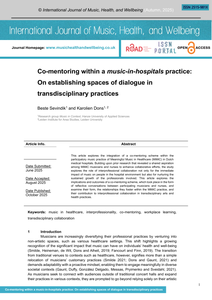This article explores the integration of a co-mentoring scheme within the participatory music practice of Meaningful Music in Healthcare (MiMiC) in Dutch medical hospitals. Building upon prior research that revealed a shared aspiration among MiMiC musicians and nurses to enhance collaborative efforts, the study explores the role of interprofessional collaboration not only for the immediate impact of music on people in the hospital environment but also for nurturing the sustained growth of the professionals involved. This article explores the implications and outcomes of a co-mentoring scheme, which took place in the form of reflective conversations between participating musicians and nurses, and examine their form, the relationships they foster within the MiMiC practice, and their contribution to interprofessional collaboration in transdisciplinary arts and health practices.
DOCUMENT

Music can touch people deeply, and lead to wellbeing as an all-encompassing word for everything that makes life worth living, or at least can make it liveable. Musicians can play an important role in these processes, not as pseudo-therapists, but from their own artistic identity, with an approach in which they profoundly understand the social contexts to which they respond. In essence this is about connecting as a musician with those who, due to whatever circumstances, are vulnerable, and/or those who do not easily get into contact with live music.This requires new qualities and skills from such “new audience musicians” who want to engage with people in contexts beyond the concert hall, jazz club or church, like schools, hospitals, nursing homes, prisons, or e.g. the corporate world.Underpinning engagement with those new audiences is first and foremost a set of values that implies that music can work as a catalyst for communication between various groups of people from different cultural and social contexts, and can bring about social change, no matter how small (Smilde 2018: 673). Point of departure is the idea that artistic processes can have transformative potential which can bring about a sense of community, inclusion and collective identity.In this chapter, research into musicians’ engagement with new audiences will be explored through examples in the field of music and healthcare. I will do that from a biographical perspective, where the musicians’ personal and professional development is strongly influenced by their experiences in their artistic practice. Here, biographical learning processes are at the core of what we might term, musicians’ “professional performance” (Lombarts 2010).Two examples are discussed in this light, a research into the project “Music for Life”, on music and dementia, taking place in elderly care homes, and another, termed “Meaningful Music in Healthcare”, which is on music in the hospital. After that the chapter will address what everything learnt means for learning and teaching in higher music education, embracing the idea of engaging with new audiences and the potentials of Musikvermittlung.
DOCUMENT
This chapter focuses on some of the opportunities and challenges of shifting power relations for musicians, through the particular lens of western classical musicians engaged in researching a participatory music practice in a hospital in the Netherlands. It provides some context to power relations in the field of professional music making. From such a holistic perspective, power relations that musicians experience are likely to shift as they move from the conventions of the concert stage to the context of a hospital ward. Power relations in the western classical music tradition, and professional education associated with it, are clearly strongly embedded within the cultural systems, albeit often at tacit levels and partly obscured by a dominating focus on “artistic quality”. The co-existence of such authorial and collaborative strategies to help steer through the power relations appears throughout the rest of the visit, to the point where it is hard to distinguish between them.
LINK
Since 2015, the research group Lifelong Learning in Music of Hanze University of Applied Sciences Groningen, together with the University Medical Center Groningen (UMCG), has developed and researched the MiMiC practice for patients and nurses on surgical wards. The musicians make tailor-made music in the patients' rooms in collaboration with patients and nurses. They do this on the basis of verbal and non-verbal contact with patients and nurses. Person-centred music-making turns out to be easy to realise in a medical setting and to be meaningful for all involved. People who have just had surgery experience less pain. Nurses feel more deeply involved with their patients. Musicians show sensitivity for the social context in which they carry out their artistic practice.In this project the research group is developing an innovative artistic practice with a focus on elderly patients. Musicians work with patients and the care staff that are taking care of these patients during their stay in hospital. The research should lead to insights in the effects of this practice and to a new training for master students and professional musicians who want wish to specialise themselves in this field. Pilots on six different wards of the UMCG with professional musicians and master students are part of the research which will last two years in its entirety. The project has been granted funding from the 'Banning de Jong Fonds' of the national 'Prins Bernhard Cultuurfonds' and the 'Fonds Sluyterman van Loo'.
The development of a training for musicians aspiring to work in contexts with people with dementia in the Netherlands. This project was inspired by the renowned Music for Life programme by Wigmore Hall Learning in London, UK and its in-depth ethnographic study by the research group Lifelong Learning in Music which was published as While the Music Lasts by Smilde, Page and Alheit (2012).